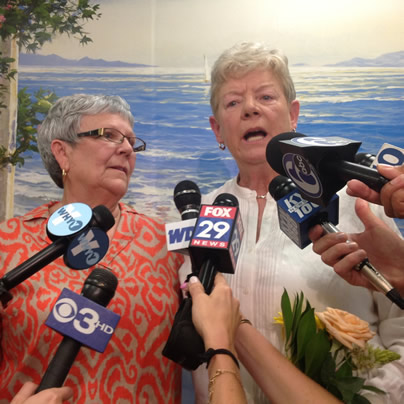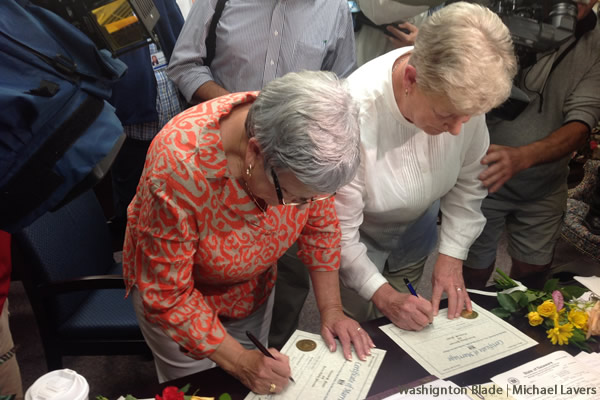Local
Delaware same-sex marriage law takes effect
Sen. Karen Peterson, Vikki Bandy converted civil union into marriage; couples apply for marriage licences


Vikki Bandy and state Sen. Karen Peterson sign their marriage certificates in Wilmington, Del., on July 1. (Washington Blade photo by Michael K. Lavers)
WILMINGTON, Del. — A Delaware lawmaker who came out during a debate over her state’s same-sex marriage bill earlier this year and her partner on Monday became the first couple to take advantage of the gay nuptials law.
State Sen. Karen Peterson (D-Stanton) and her partner, Vikki Bandy, converted their civil union into a marriage at the New Castle County Clerk of the Peace’s office in Wilmington.
“It’s exciting, both historically and personally,” Peterson told reporters after she and Bandy exchanged vows in a private ceremony. “I never thought in our lifetimes we would be getting married.”

Daniel Cole and Joseph Daigle, II, of Wilmington, Del., on Monday became the first same-sex couple without a civil union to legally marry in the state. (Washington Blade photo by Michael K. Lavers)
Rehoboth Beach residents Chris Beagle and Eric Engelhart later on Monday became the first gay couple in Sussex County to convert their civil union into a marriage. Joseph Daigle, II, and Daniel Cole of Wilmington are the first same-sex couple who had not previously entered into a civil union to tie the knot in Delaware.
Attorney General Beau Biden and New Castle County Executive Tom Gordon are among those who spoke at Daigle and Cole’s wedding that took place inside the Marian Cruger Coffin Gardens at the Gibraltar Mansion in Wilmington on Monday evening.
“Today we are witnesses to a historic event for Delaware and for our community and quite frankly our future,” Biden said.
Daigle and Cole spoke with reporters after they exchanged vows.
“This was one of the most exciting moments of my life,” Daigle said. “I am so happy to be married to Dan.”
New Castle County Clerk of the Peace Ken Boulden, who officiated both Peterson and Bandy and Daigle and Cole’s weddings, said 108 same-sex couples in Delaware received marriage licenses on Monday. The state did not waive the 24-hour waiting period for any other gay or lesbian couples on the first day they could legally tie the knot.
Alexander Perez and Brad Poulter of Wilmington, who have been together for eight years, received their marriage license at the New Castle County Clerk of the Peace’s office shortly after Peterson and Bandy exchanged their marriage vows.
The men plan to tie the knot in Wilmington on July 13.
“It’s great to be living in a state that recognizes equality, realizes everyone is equal,” Poulter said.
11 states and D.C. now allow same-sex marriage.
Gays and lesbians in Minnesota and Rhode Island will begin to legally tie the knot on August 1.
The U.S. Supreme Court on June 26 found a portion of the Defense of Marriage Act unconstitutional and struck down California’s Proposition 8 that had banned same-sex marriage. Gays and lesbians in the Golden State began to once again exchange vows on June 28 after the U.S. Ninth Circuit Court of Appeals listed its stay on gay nuptials in response to the justices’ Prop 8 ruling.
“You realize the benefits that you don’t have by not having marriage, or in our case civil unions,” Peterson said, noting Bandy was diagnosed with stage three ovarian cancer three years ago.
Bandy is now in remission, but Peterson had to pay extra taxes because her now spouse was on her health insurance policy.
“With DOMA gone that will not happen,” Peterson said.
A handful of Westboro Baptist Church members protested outside the New Castle County offices in which the Clerk of the Peace is located before Peterson and Bandy exchanged vows. The more than 100 same-sex marriage supporters who gathered across the street vastly outnumbered them.
“If you don’t want a gay marriage, don’t get one,” Alison Sprong of New Jersey told the Washington Blade as she stood among other same-sex marriage supporters outside the county offices in downtown Wilmington. “Don’t infringe on other peoples’ rights to do so.”
Wilmington resident Alex Koriakin, who plans to marry his partner next year, agreed as he applauded the state for allowing gays and lesbians to tie the knot.
“It’s time,” he said. “It’s great that Delaware can be one of the first states to take advantage of that.”
Equality Delaware President Lisa Goodman, who also applied for a marriage license with her spouse, Drew Fennell, on Monday, agreed.
“So many people have worked for so many years to get us to this day,” Goodman told the Blade before she entered the county’s offices to attend Peterson and Bandy’s ceremony. “To actually be standing here about to go in and have the first licenses issued is just an amazing feeling.”
Maryland
Md. Commission on LGBTQIA+ Affairs released updated student recommendations
LGBTQ students report higher rates of bullying, suicide

The Maryland Commission on LGBTQIA+ Affairs has released updated recommendations on how the state’s schools can support LGBTQ students.
The updated 16-page document outlines eight “actionable recommendations” for Maryland schools, supplemented with data and links to additional resources. The recommendations are:
- Developing and passing a uniform statewide and comprehensive policy aimed at protecting “transgender, nonbinary, and gender expansive students” against discrimination. The recommendation lists minimum requirements for the policy to address: name, pronoun usage, and restroom access.
- Requiring all educators to receive training about the specific needs of LGBTQ students, by trained facilitators. The training’s “core competencies” include instruction on terminology, data, and support for students.
- Implementing LGBTQ-inclusive curricula and preventing book bans. The report highlights a “comprehensive sexual education curriculum” as specifically important in the overall education curriculum. It also states the curriculum will “provide all students with life-saving information about how to protect themselves and others in sexual and romantic situations.”
- Establishing Gender Sexuality Alliances “at all schools and in all grade levels.” This recommendation includes measures on how to adequately establish effective GSAs, such as campaign advertising, and official state resources that outline how to establish and maintain a GSA.
- Providing resources to students’ family members and supporters. This recommendation proposes partnering with local education agencies to provide “culturally responsive, LGBTQIA+ affirming family engagement initiatives.”
- Collecting statewide data on LGBTQ youth. The data on Maryland’s LGBTQ youth population is sparse and non-exhaustive, and this recommendation seeks to collect information to inform policy and programming across the state for LGBTQ youth.
- Hiring a full-time team at the Maryland Department of Education that focuses on LGBTQ student achievement. These employees would have specific duties that include “advising on local and state, and federal policy” as well as developing the LGBTQ curriculum, and organizing the data and family resources.
- Promoting and ensuring awareness of the 2024 guidelines to support LGBTQ students.
The commission has 21 members, with elections every year, and open volunteer positions. It was created in 2021 and amended in 2023 to add more members.
The Governor’s Office of Communication says the commission’s goal is “to serve LGBTQIA+ Marylanders by galvanizing community voices, researching and addressing challenges, and advocating for policies to advance equity and inclusion.”
The commission is tasked with coming up with yearly recommendations. This year’s aim “to ensure that every child can learn in a safe, inclusive, and supportive environment.”
The Human Rights Campaign’s most recent report on LGBTQ youth revealed that 46.1 percent of LGBTQ youth felt unsafe in some school settings. Those numbers are higher for transgender students, with 54.9 percent of them saying they feel unsafe in school.
Maryland’s High School Youth Risk Behavior Survey reveals a disparity in mental health issues and concerns among students who identify as LGBTQ, compared to those who are heterosexual. LGBTQ students report higher rates of bullying, feelings of hopelessness, and suicidal thoughts. Nearly 36 percent of LGBTQ students report they have a suicide plan, and 26.7 percent of respondents say they have attempted to die by suicide.
The commission’s recommendations seek to combat the mental health crisis among the state’s LGBTQ students. They are also a call for local and state governments to work towards implementing them.
Virginia
Va. lawmakers consider partial restoration of Ryan White funds
State Department of Health in 2025 cut $20 million from Part B program

The Virginia General Assembly is considering the partial restoration of HIV funding that the state’s Department of Health cut last year.
The Department of Health in 2025 cut $20 million — or 67 percent of total funding — from the Ryan White Part B program.
The funding cuts started with the Trump-Vance administration passing budget cuts to federal HIV screening and protection programs. Rebate issues between the Virginia Department of Health and the company that provides HIV medications began.
Advocates say the funding cuts have disproportionately impacted lower-income people.
The Ryan White HIV/AIDS Program, a federal program started in 1990, provides medical services, public education, and essential services. Part B offers 21 services, seven of which remained funded after the budget cuts.
Equality Virginia notes “in 2025, a 67 percent reduction severely destabilized HIV services across the commonwealth.”
Virginia lawmakers have approved two bills — House Bill 30 and Senate Bill 30 — that would partially restore the funding. The Ryan White cuts remain a concern among community members.
Both chambers of the General Assembly must review their proposed changes before lawmakers can adopt the bills.
“While these amendments aren’t a full restoration of what community-based organizations lost, this marks a critical step toward stabilizing care for thousands of Virginians living with HIV,” said Equality Virginia Executive Director Narissa Rahaman. “Equality Virginia plans to continue their contact with lawmakers and delegates through the conference and up until the passing of the budget.”
“We appreciate lawmakers from both sides of the aisle who recognized the urgency of this moment and will work to ensure funding remains in the final version signed by the governor,” added Rahaman.
District of Columbia
D.C. Black Pride theme, performers announced at ‘Speakeasy’
Durand Bernarr to headline 2026 programming

The Center for Black Equity held its 2026 DC Black Pride Theme Reveal event at Union Stage on Monday. The evening, a “Speakeasy Happy Hour,” was hosted by Anthony Oakes and featured performances by Lolita Leopard and Keith Angelo. The Center for Black Equity organizes DC Black Pride.
Kenya Hutton, Center for Black Equity president and CEO, spoke following the performances by Leopard and Angelo. Hutton announced this year’s theme for DC Black Pride: “New Black Renaissance.”
Performers for 2026 DC Black Pride were announced to be Bang Garcon, Be Steadwell, Jay Columbus, Bennu Byrd, Rue Pratt and Akeem Woods.
Singer-songwriter Durand Bernarr was announced as the headliner for the 2026 festivities. Bernerr gave brief remarks through a video played on the screen at the stage.
DC Black Pride is scheduled for May 22-25. For more information on DC Black Pride, visit dcblackpride.org.


















